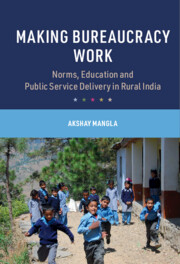Crossref Citations
This Book has been
cited by the following publications. This list is generated based on data provided by Crossref.
Singh, Nirvikar
2019.
Theories of Governance and Development: How Does India’s Experience Fit?.
SSRN Electronic Journal ,
Mundy, Karen
2023.
SDG 4 and state capacity: The missing link.
International Journal of Educational Development,
Vol. 103,
Issue. ,
p.
102937.
González‐Martínez, Nashellit
and
Peeters, Rik
2024.
Relational street‐level bureaucracy: Proximity policing and the construction of trust between citizens and municipal police officers in Nezahualcóyotl, Mexico.
Australian Journal of Public Administration,
Gallagher, Janice K.
Kruks-Wisner, Gabrielle
and
Taylor, Whitney K.
2024.
Claim-Making in Comparative Perspective.
Naveed, Arif
2024.
More Snakes Than Ladders: Mass Schooling, Social Closure, and the Pursuit of Taraqqi (Social Mobility) in Rural Pakistan☆.
Rural Sociology,
Vol. 89,
Issue. 3,
p.
375.
AUERBACH, ADAM MICHAEL
SINGH, SHIKHAR
and
THACHIL, TARIQ
2024.
Who Knows How to Govern? Procedural Knowledge in India’s Small-Town Councils.
American Political Science Review,
p.
1.
Aiyar, Yamini
2024.
Lessons in State Capacity from Delhi's Schools.
Adhikari, Anindita
and
Heller, Patrick
2024.
Civil society, the state and institutionalizing welfare rights in India.
World Development,
Vol. 182,
Issue. ,
p.
106687.
Wang, Yanbo
Siegel, Jordan
and
Li, Jizhen
2024.
Who captures the state? Evidence from irregular awards in a public innovation grant program.
Strategic Management Journal,
Vol. 45,
Issue. 12,
p.
2420.
Rahman, Andaleeb
and
Pingali, Prabhu
2024.
The Future of India's Social Safety Nets.
p.
357.
Eiró, Flávio
and
Lotta, Gabriela
2024.
On the Frontline of Global Inequalities: A Decolonial Approach to the Study of Street-Level Bureaucracies.
Journal of Public Administration Research and Theory,
Vol. 34,
Issue. 1,
p.
67.
Chan, Kyle
2024.
Emotional bureaucrats: The paradox of Weberian bureaucracy and emotions in the Indian Railways.
Current Sociology,
LaPatin, Michaela
Ritsch, Nicola
Armanios, Daniel Erian
Albertson, Leif
Katz, Lynn E.
and
Faust, Kasey M.
2024.
A Stakeholder-Systems Analysis of Water Provision in Rural Alaska.
ACS ES&T Water,
Vol. 4,
Issue. 2,
p.
575.
Davies, Emmerich
2025.
Absence: Electoral Cycles and Teacher Absenteeism in India.
British Journal of Political Science,
Vol. 55,
Issue. ,
Bell, Sheena
2025.
Understanding the competing logics of district education office work: The case of Ghana.
International Journal of Educational Development,
Vol. 113,
Issue. ,
p.
103219.



